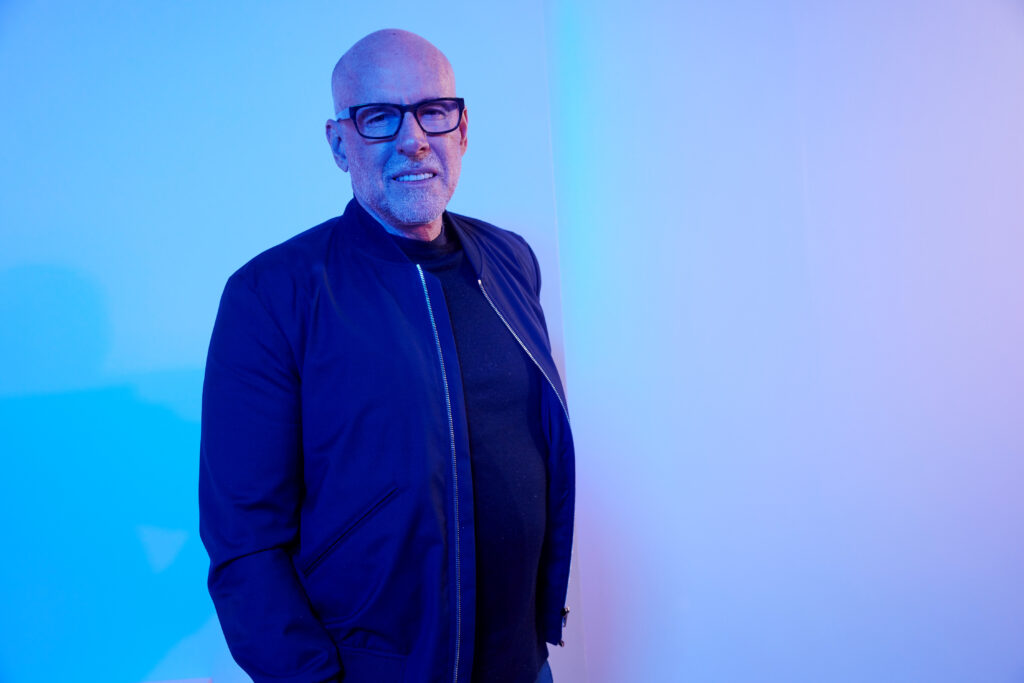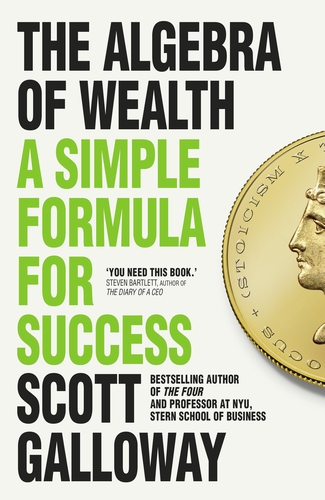
Entrepreneur, investor, writer, podcaster, media personality, marketing professor at NYU’s Stern School of Business—Scott Galloway wears a lot of hats. With a delivery that is at once irreverent, hilarious, honest, brilliant, self-deprecating, and sometimes naughty, it’s no wonder the New York Times dubbed him the Howard Stern of the business world. With a new book on the shelves, he speaks to GEORGE HAHN about how we can all get our finances back in shape.
“To be economically secure is to be loved… [America] is a loving, generous place if you have money; it’s a violent, rapacious place if you don’t,” says Scott Galloway. The author has firsthand experience with our country’s duality. The 59-year-old best-selling author—whose new book, The Algebra of Wealth: A Simple Formula for Financial Security, came out in April—was raised by a single mother on a secretary’s salary. As an adult, he again found himself in a vulnerable financial position, due to increasing his lifestyle to match his income, rather than prioritizing saving. “Capitalism produces unbelievably seductive, almost irresistible, offers. I want to make people aware of those temptations, and just show them—with some basic principles you can cement into your daily activity—that you can end up in a good place.”
It’s this message, and finding and maintaining financial security, that have become a tentpole in his own brand message.
Galloway sprung onto the radar of many in 2019 when he called out the now famously ridiculous WeWork prospectus and the cult of Adam Neumann with an incendiary, but accurate, post on his weekly blog and newsletter No Mercy / No Malice. From there and on his award-winning podcast, The Prof G Pod, Galloway shared his expertise and experience, combining “business insight and analysis with provocative life and career advice.”
In addition to the work through his media company, Prof G Media, along with regular appearances on CNN, MSNBC, and Real Time with Bill Maher, Galloway is also the cohost of the essential biweekly podcast Pivot, where he, Kara Swisher, and their guests discuss the latest in tech, business, and politics.
The Algebra of Wealth is organized around four key disciplines: stoicism, focus, time, and diversification. These four ideas were inspired by his own work and life experience over the years, as if, he says, “I was going to try and give my 18- or 28-year-old self four basic principles to ensure that I would get rich slowly, but I would end up economically secure.” They are straightforward concepts that, according to Galloway, stand the test of time.
One of Galloway’s biggest takeaways from his times of financial un-wellness might be summed up in one word: diversification. “I was never diversified enough. I was always overly invested in my company or tech,” he laments. “Diversification is your Kevlar.”
He attests that diversification benefits not just your financial well–being, but also your mental health. “When you’re so invested in one thing, you’re constantly checking your phone,” he notes. “It can just ruin your gear.”
The following is an excerpt from The Algebra of Wealth: A Simple Formula for Financial Security.

A few years ago, we went skiing, a hobby I endure to trap my boys on a mountain so they have to spend time with me. One afternoon, I’m in our hotel room in Courchevel, using work as an excuse to escape my on‑piste obligations. My eldest, who was 11 at the time, comes in, and I know something is wrong. As a rule, both sons reflexively announce themselves whenever they enter a room with a question or bodily function. (“Can I watch TV?” “Where’s Mom?” Belch.) But… silence, until he’s in front of me. He’s been crying.
“What’s wrong?”
“I lost a glove.” More tears.
“That’s okay, it’s only a glove.”
“You don’t understand. Mommy just bought me these. They cost €80. That’s a lot of money. She’s going to be angry.”
“She’ll understand. I lose stuff all the time.”
“But I don’t want her to buy me another pair—they were €80.”
Easy for me to be empathetic here. My son’s tendency to lose stuff is inherited. My ex‑wife said if my penis wasn’t attached, we’d run across it in SoHo on a card table next to secondhand books and a script for Goodfellas. I don’t carry keys, what’s the point?
So, I got this. We agree to retrace his steps. Along the way my mind races: Is this a life lesson? Would buying him a new pair be coddling? I look down—he’s crying. The ground splits beneath me, and instantly I’m nine again.
After my folks separated, economic stress turned to economic anxiety. Anxiety gnawed at my mom and me, whispering in our ears that we weren’t valid, that we’d failed. My mom, a secretary, was smart and hardworking… and our household income was $800 a month. I told Mom, at the age of nine, that I didn’t need a babysitter, because I knew we could use the additional $8 a week. Also, when the ice cream truck came by, my sitter gave each of her kids 30¢ and me 15¢.
“It’s winter, you need a jacket,” my mom said; so off to Sears we went. We bought one a size too big, as my mom figured I could get two, maybe three years out of it. It cost $33. Two weeks later, I left my jacket at Cub Scouts, but I assured my mom we’d get it back at the next meeting. We didn’t.
So off to get another jacket, this time to JCPenney. Mom told me this one was my Christmas present, as we wouldn’t have the funds for gifts after buying another jacket. I don’t know if this was true or if she was trying to teach me a lesson. Likely both. Regardless, I tried to feign excitement at my early Christmas present, which, incidentally, also cost $33.
Several weeks later… I lost the second jacket. I sat at home after school, in fear, waiting for my mom to come home and absorb another body blow to our already economically feeble household. I heard the key turn, she walked in, and I nervously blurted out, “I lost the jacket. It’s okay, I don’t need one… I swear.”
I felt like crying, bawling really. But something worse happened. My mom began to cry. Then she composed herself, walked over to me, made a fist, and pounded on my thigh several times as if she were in a boardroom trying to make a point, and my thigh was the table she was slamming her fist on. I don’t know if it was more upsetting or awkward. She then went upstairs to her room. She came down an hour later, and we never spoke of it again.
Economic anxiety is high blood pressure—always there, waiting to turn a minor ailment into a life-threatening disease. That’s not a metaphor. Kids who grow up in low-income households have higher blood pressure than kids who live in wealthy ones.
“We live in an era of innovation in finance, but no cryptocurrency or payment app will offer what I want most—to send money back in time, to the people I loved who didn’t have it.”
Scott Galloway
Meanwhile, back in the Alps, a dad and his one-gloved son have been walking for 30 minutes in eight‑degree weather. I attempt to take advantage of his weakened state and break into a song and dance about how things aren’t important, but relationships are. In the midst of this bad Hallmark Channel scene, my son stops, then sprints to a small Christmas tree in front of the Philipp Plein store. The same store where, the day before, his eight‑year-old brother tried to persuade me to buy him a €250 hoodie with a bedazzled skull on the back. On top of the tree, in place of the star, is one electric-blue boy’s glove. A good—and creative—Samaritan had found it and placed it within eyeshot of any boy searching for the vibrant accessory. My son grabs the glove, sighs, holds it to his chest, and visibly feels a mix of relief and reward.
We live in an era of innovation in finance, but no cryptocurrency or payment app will offer what I want most—to send money back in time, to the people I loved who didn’t have it. The insecurity and shame present in my childhood home will always be there. But that’s okay, as it was motivating.
Your pursuit of wealth may be driven by something else. Perhaps validation, or a feeling of purpose. A passion for the good life, luxuries and experiences only money can bring. The desire to do something about the ills of the world. In my experience, noble intentions are a good motivation for hard work, and desire is also powerful— but fear bests them both. What drives you is your business. Find it, nurture it, and carry it with you.
You will need motivation, as there is hard work ahead.
The Algebra of Wealth: A Simple Formula for Financial Security by Scott Galloway is available now from Portfolio/Penguin.

